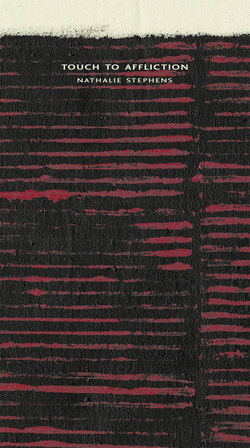Читать книгу Touch To Affliction - Nathalie Stephens - Страница 7
На сайте Литреса книга снята с продажи.
Le Poème Affligé
ОглавлениеLet me tell you some of what I have seen. Amid the languages I speak and those I keep concealed. Things I have touched with my hands and those that have eluded me.
Through a window in an old wooden door the sky breaks at dusk. What remains is a dark stain where none was. And my inability to recall the shape of things before.
There is a telephone with a cut cord and a dog lying heavily against the wall. It is or is not cold.
I walk from one end of a room to another.
I walk from one end of a garden to another.
What remains after seeing is a short burst of colour, gone.
After suggests something other. Other than what is before me. This letter, your name.
Language that is conciliatory rebukes the body. I am offended by the nature of words and their ability to dissuade. Often I am most offended by the words of your language. The language in which I write. The language that sets my body against itself. And dismantles the present.
In your language, there is illusion, but there is no hope.
In hope, there is illusion.
And in illusion, there is the stuff of language.
I have acquired a viola that in time I will learn to play. Do you still listen to Górecki? I have also acquired the score to ‘Already It Is Dusk.’ In it, Górecki notes: ‘The viola is always “en dehors,” but not too much.’ Do you know what this means? I believe it to mean that the viola for Górecki is much as some poets intend language to be. The viola is always underneath the music. Underneath is the suggestion of itself. It is outside. In another language I would say: Désincarné. But I would not say: Disembodied.
Affliction is a capital word. Affliction is the blood of poetry.
Don’t misunderstand me. Through the window in the door, I see the afflicted sky. It is afflicted because it is out of reach. For a poet, this too might be the nature of language. And it might also be the nature of the poet, in relation to others. For the poet must make language into two things simultaneously: sobriety and passion. Does not Buber do the same through Walter Kaufmann?
‘And to gain freedom from the belief in unfreedom is to gain freedom.’
Where is the poet who will return language to the body?
Where is the body that is prepared to receive language?
I am sending you plays by Koltès. I think that you will know what I mean.
